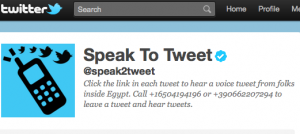The traditional wisdom of despots says depriving people of information and a way to communicate with others is the key to staying in power. But that’s not working in Egypt’s revolution.
Technology, and social media, are quickening the pace of social change, catching governments unaware and impotent.
 The revolution will be Re-Tweeted.
The revolution will be Re-Tweeted.
Renegade freedom blogger Mahmoud Salem (on Twitter as @sandmonkey), interviewed by AdVerve says on his blog that he is extremely hopeful the protesters “…will end up with an actual political process and representative political parties that will actually discuss policy and have to represent those who voted for them so that they can get re-elected. Democracy in action. An old but brilliant concept.”
However, he notes, “Mubarak is still President, Emergency law is still in effect, the parliament hasn’t been dissolved, new elections haven’t been called for and the constitution is still that flexible document that the ruling party can change whenever they see fit. Even though we appear to be winning, we are not by a long shot.”
The Internet is still being accessed, with global help
The Egyptian government cut off the Internet, cellular phones and text messaging. “In spite of this,” Times Live reports “…Egyptians have been able to communicate. Dial-up modems (the bunny ears of the internet) have been used, as have satellite connections and other clever mechanisms.
To give Egyptians a way to communicate with the rest of the world, last week Google, Twitter and a company called SayNow removed launched a service last week called speak2tweet.
There are phone numbers for people to call to record a message. An audio file is then posted to Twitter. Anyone can listen to these voice-to-tweet messages here. The stream has more than 10,000 folowers.
Volunteers are translating the messages into English, Spanish and French at the website Alive in Egypt.
People are also showing their support for the protesters through pages on Facebook. Facebook says it has five million users in Egypt, including one million on mobile devices.
Says Angela Natividad on her blog
“Faster communications makes territory less important and distances insignificant. That means institutionalised repression and blows to free thinking, to the liberty that sparks innovation, becomes everybody’s business. The world is now too small for this.”
The outcome remains to be seen, but – thankfully – social media will play a role no matter what. It no longer is possible for anyone, even a repressive government to have total control of communications anywhere in the world.







